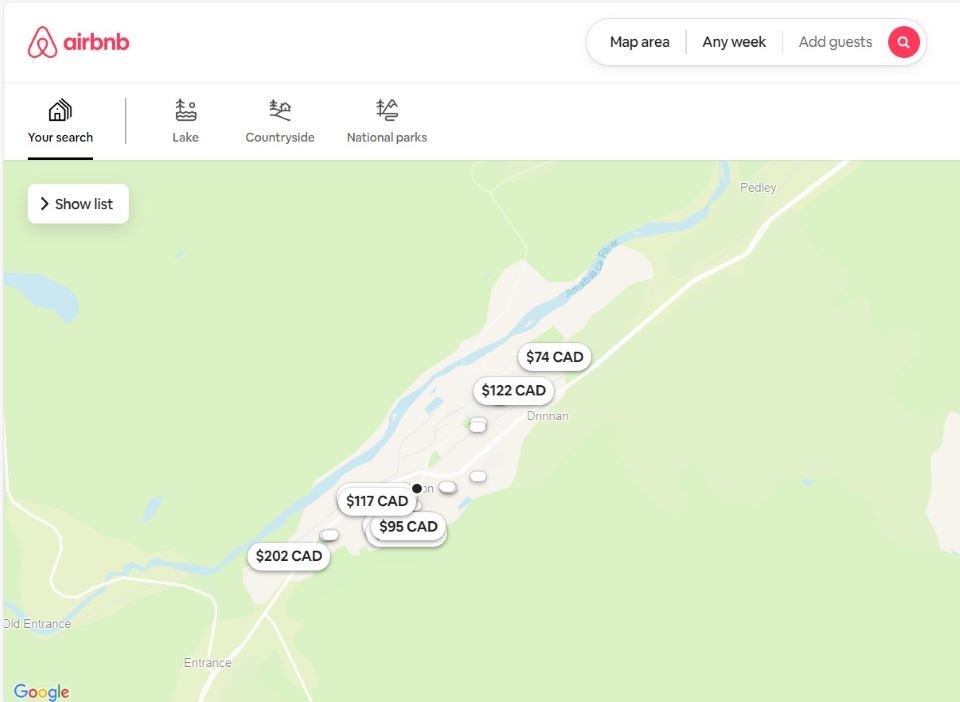The Town of Hinton is planning to introduce a cap of 100 licences available for short-term rentals, such as Airbnbs or VRBOs, that are non-principal residences.
Hinton council gave first and second readings to the short-term rental bylaw on Tuesday (Oct. 15). The subject is expected to go to a committee of the whole meeting before council gives third and final reading.
Coun. Stuart Taylor, who has been critical of the proposed restrictions, had moved to remove the cap from the bylaw.
“The assertion that short-term rental regulation affects affordable housing is not supported by data,” Taylor said. “Certainly, last week, we heard from administration there’s no data to pick the right number, and therefore a hundred is a random number.”
According to Town administration, too many short-term rentals can negatively affect the availability of long-term rental properties and rental homes for residents as well as increase long-term rental prices.
Public feedback gathered by the Town indicated that 43 per cent of comments showed support for short-term rentals, and 57 per cent showed opposition and wanted tighter controls.
Supporters highlighted the positive impact on tourism, economic growth and entrepreneurship while emphasizing the need to uphold property rights.
Opponents voiced concern about disruptive guests, reduced housing availability and the town’s ability to enforce current regulations.
Taylor argued a lack of data on the cap meant council would be proceeding with “an ill-informed regulation” that could discourage people from buying property in Hinton and impact tourism to the region.
“Let’s solve the housing situation by building more houses instead of depriving property owners of their rights through short-sighted and ill-informed regulations,” he said.
The motion was defeated, with only Taylor voting in favour.
Coun. Ryan Maguhn challenged the assertion there was no data to suggest short-term rentals were impacting the rental market. He pointed out that a search on Airbnb revealed how short-term rentals were encroaching on lower-tier housing.
“I don’t think the wild-west approach of not having a cap and just letting the market do what it will is actually appropriate in this case,” Maguhn said. “For myself, not anecdotally, I’ve had a neighbour who’s pushed out of the community due to this.”
Maguhn was ultimately worried Hinton would start to lose families because investors from outside of town would buy up housing, but he acknowledged it was difficult to determine what number was appropriate for the cap.
Maguhn made a motion to increase the cap to 130 non-principal residential units and later another motion for a 135 cap, but both were defeated.
Based on information from a contracted software company, the Town estimates there were 26 licensed non-principal residence short-term rentals with many more that were unlicensed.
Coun. Trevor Haas noted Hinton had gone from having 75 non-principal residence short-term rentals in 2022 to now having about 130. He also noted following the wildfire that destroyed nearly a third of the Jasper townsite, it would become more enticing to have short-term rentals in nearby Hinton.
“It’s our responsibility as a council to look into the future of what could happen and what is a fair balance,” Hass said. “And I think having no cap is not responsible decision-making for the future.”
Hass added while short-term rentals were good for tourism, the service industry needed housing for their employees.
He later moved apartment buildings to be excluded as short-term rentals so these properties could be reserved for residents, with the motion passing 5-1.
Town administration says it would track licensed short-term rentals until the cap is met and would then begin a waitlist. Any unlicensed properties would be fined. The town would also hire an identification service.
Short-term rentals in non-principal residences must pay a business licence fee of $1,500 per year, compared to $165 for short-term rentals in principal residences and $160 for other businesses.
Council directed administration to work with local real estate agencies to establish information about where the local real estate market is most active. This information would be brought back to committee of the whole where the matter will be further discussed.




